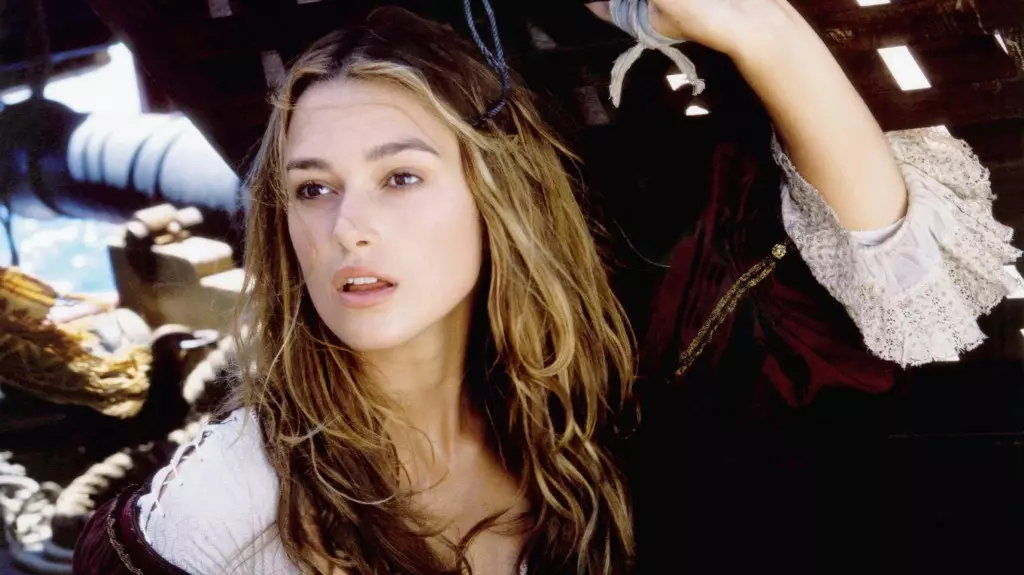Keira Knightley has been a prominent figure in the film industry since she burst onto the scene at the young age of 17 with her role in the iconic “Pirates of the Caribbean” franchise. Her ascent to stardom came with both triumph and turmoil, leading her to reflect critically on her journey in a recent interview with The Times of London. Knightley articulated the paradoxical nature of her fame—while the franchise catapulted her into the spotlight, it also subjected her to intense public scrutiny and criticism. This interplay of adulation and derision shaped her experience as a young actress navigating an industry fraught with challenges.
The actress poignantly shared her feelings regarding the duality of her early career, stating that her involvement in the “Pirates” films was both a blessing and a curse. On one hand, these blockbuster successes provided her doors to other significant roles, such as those in “Atonement” and “Pride & Prejudice,” both of which garnered her Academy Award nominations. Yet, the same films that elevated her career also brought with them a wave of scrutiny, leaving her feeling “seen as sh–,” indicative of the toxic environment perpetuated by tabloid culture and public opinion.
Avoiding the Franchise Fatigue
Now, years removed from her time in “Pirates of the Caribbean,” Knightley has decisively ruled out returning to a franchise that once defined her early career. She articulated the exhaustive demands involved in such blockbuster projects, highlighting the relentless filming schedules, loss of creative control, and the overall burden of carrying a franchise. Her words reflect a growing trend among high-profile actors who seek to redefine their careers on their own terms, moving away from projects that might pigeonhole them.
Knightley’s concerns are not just limited to her own experience; they point to a broader commentary on the modern film industry. As studios increasingly rely on established franchises to guarantee box office success, actors often find themselves at the mercy of a system that prioritizes commercial viability over individual artistry. Knightley’s choice to step away from the franchise model speaks volumes about the importance of reclaiming agency in an industry that can often feel relentless and unforgiving.
In her candid discussion, Knightley illuminated issues surrounding mental health and body image that many struggle with but few openly discuss, especially in the entertainment sector. Reflecting on the insidious nature of public shaming, she revealed the impact of online speculation about her body and diet, which often felt detached from her reality. Her acknowledgment of this trauma not only sheds light on her personal struggles but also serves as a call for greater awareness and compassion regarding these sensitive topics.
Knightley remarked on an almost dissociative experience around her youth in the limelight, indicating a “complete delete” from memories that were tainted by relentless public scrutiny. This underscores a vital conversation about the implications of fame on mental well-being, particularly for young women who are thrust into the public consciousness amidst hyper-criticism.
Amid her reflections on fame, Knightley also emphasized the importance of stepping back and reassessing priorities. Having taken time off from acting to focus on family life—raising her two daughters with musician husband James Righton—she has achieved a reprieve from the pressures of Hollywood. Yet, she remains committed to her craft, with her upcoming role in the Netflix series “Black Doves” marking her return to television after a hiatus.
Knightley’s story is not just one of stardom; it is a narrative of resilience, self-discovery, and the pursuit of authenticity in an industry built on illusions. As she navigates the complexities of fame, she continues to share her journey, illustrating how one can grow beyond the superficial definitions of success and carve out a fulfilling personal and professional identity. It’s a step towards normalizing the conversation around the highs and lows of celebrity, reminding others that even those on the peaks of success face their own inner battles.

